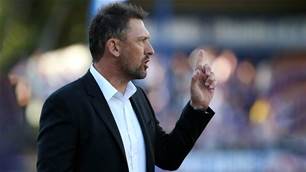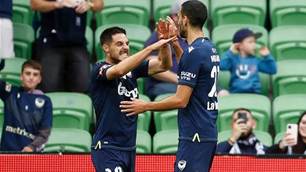Melbourne Victory Head Coach Marco Kurz had issued one plea with his side ahead of Friday night’s win over Perth Glory: Get the basics right.
Comprehensively outclassed by Adelaide United at Coopers Stadium a week prior, Victory entered round eight in the midst of one of the worst starts in their club history.
Brought into the club to usher in a new, post-Kevin Muscat era in part because he was considered an A-League proven pair of hands that would ensure a somewhat seamless transition, Kurz instead had begun himself the subject of speculation.
The German, however, didn’t concoct some brilliant tactical plan to get himself out of the predicament, nor did he swing the axe at the selection table or resort to over the top, theatrical team-building exercises.
Instead, keeping with his somewhat mechanical perspective on the game, Kurz reverted to type.
“Basics for me in soccer is ‘I want to win a duel, I want to win a run duel, I want to win the one against one’ and, in this case, Adelaide were better,” the Victory gaffer said yesterday.
“We lost every second ball [against Adelaide], we lost the first ball, we lost the run duel and afterwards you can speak about tactics or this kind of stuff, but you must show the basics on the pitch.”
When one is in a state of near-freefall like Victory are, such an approach carries clear merit.
As seemingly everything goes against you, there is a certain comfort that can be found in retreating towards the same principles that were drilled into you by every coach you had since childhood – an escape back into muscle memory and acting without thinking.
Such an approach removes a level of uncertainty that can come with attempting to institute new principles or game plans.
It's very much not a recipe for sustained success but with Victory's backs against the wall against Perth, it’s a move that, at least for one night, paid off.
Despite being thoroughly out-possessed by their West Australian opponents, Victory did what they had to do, when they had to do it, where they had to do it, to take the three points at AAMI Park.
Pushed back on their heels by a gallant Glory in the second half – who quite clearly dominated play in the second half and should have equalised in the 50th minute when Bruno Fornaroli hit the post – they doggedly held on to deny their opponents, protect the lead and win a vital three points.
Victory’s commitment was exemplified in the opening moments of the contest by Robbie Kruse – who was making his first start for Victory since he departed the club for Fortuna Dusseldorf almost a decade prior.
Charging hard for a loose ball the 31-year-old - despite a long and storied history with injury that has already added a new chapter this season - put his body on the line and hurled himself into a contest for the ball with Perth’s Ivan Franjic and put his former Socceroos teammate on his behind.
It was a fitting beginning to a first half that was dominated by the returning Victory favourite.
The attacker’s nous was on full display in the 10th minute when he collected the ball in the midfield and took a moment to compose himself while still under pressure before turning and lofting a ball over the top of the defence for an unfortunately offside Andrew Nabbout.
Two minutes later he was involved again as he, Nabbout and Elvis Kamsoba combined to knock at Glory’s door.
Though the game certainly wasn’t one-way traffic – Neil Kilkenny went within inches of putting his side ahead with a long-range effort in the 16th minute – Kruse’s presence was giving Victory’s attack a clear edge.
Then, in the 33rd minute, Kruse scored his first A-League goal since round 25, 2010/11 when he got into the right space at the right time to meet a low ball across the face of goal from Nabbout and fire his side ahead.
Five minutes before the half a tantalising display of what might be to come for Victory was on show when a masterful flick from Ola Toivonen sprung Kruse down the left and enabled a cross in towards Nabbout that went just beyond his outstretched boot.
Though his influence waned as Glory seized control and he was withdrawn for Kenny Athiu in the 88th minute, Kruse demonstrated against Glory that, if his team can begin to do more than the basics, he can be a spark that takes them a long way.
Related Articles

Popovic out to break duck in Victory's ALM decider
.jpeg&h=172&w=306&c=1&s=1)
Melbourne City take premiership after Sydney FC blow it













